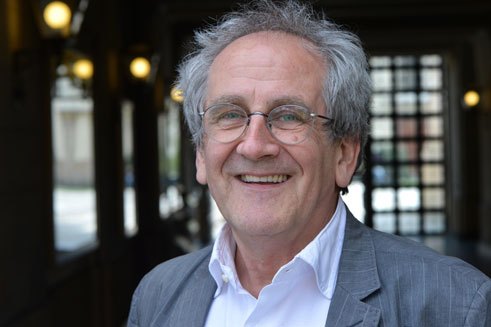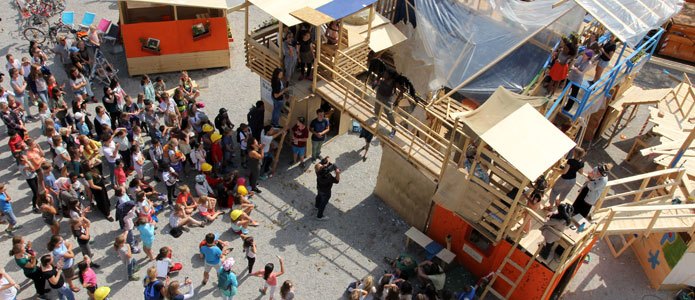What can be done to improve education? Educationalist and filmmaker Reinhard Kahl has compiled an “Archiv der Zukunft” – an archive of the future – in which he presents examples that point the way forward.
There are no magic formulas, says Reinhard Kahl, but there are “images of success”. An educationalist and filmmaker, Kahl champions a better world of education. In his documentary films and an “Archiv der Zukunft” he presents places in which knowledge, ideas and abilities thrive. He has been awarded the Grimme Prize among other things for his work.
 Reinhard Kahl
| Photo: © private
Mr Kahl, what are you working on just now?
Reinhard Kahl
| Photo: © private
Mr Kahl, what are you working on just now?
We spent three weeks filming the city of Munich’s holiday programme in its “Mini Munich” play town. We were just bowled over by the sheer joy and abandon with which the kids threw themselves into the activities! Learning happens when people concentrate on something they find fascinating, and when they are given the chance to try out this thing, testing themselves in the process. This gives rise to a level of enjoyment that is really quite contagious. According to these children, who spent their holidays making, baking or cooking, or making films or newspapers: “That is really living.”
“Enjoyment goes hand in hand with good grades”
The “Archiv der Zukunft” was established in 2004. What is the idea behind it?
The intensity and thus the effectiveness of learning that we experienced at “Mini Munich” has always been our focus. Further impetus came in 2001 in the form of the “Pisa shock”, when German schoolchildren scored comparatively poorly in the OECD study. The subject of all-day schools was raised, and people began to realize that enjoyment may after all go hand in hand with good grades. I made a film entitled
Treibhäuser der Zukunft – Wie Schulen in Deutschland gelingen (i.e. Greenhouses of the Future – How Schools in Germany Can Succeed). It shows children with shining eyes who are achieving top grades at school. The two are related, as the “Archiv der Zukunft” demonstrates.
What does it contain?
We collect stories and ideas about renewing the system and show schools and other projects that are embarking on modern paths. We make the documentaries available as tools to any experts who may be interested. In addition, recordings of discussions with education experts can be found on our YouTube channel.
Ten years ago, a network was added to the archive. How did this come about?
For one thing, there was a great response to the film
Treibhäuser der Zukunft – around 60,000 DVDs were sold. Furthermore, we discovered that many schools and educational institutions were engaged in exciting projects but did not know about each other. We want to connect these actors, which in some cases differed considerably from one another. This is how the plan came about to add a network of the same name to the “Archiv der Zukunft”. Our education conferences in Hamburg and at Lake Constance were booked out immediately, as were the “Theater träumt Schule” (i.e. Theatre Dreams School) events that we ran in cooperation with various theatres in Germany. There was great interest, many new ideas were enthusiastically received, and regional groups were formed. Recently this dynamism has dwindled somewhat. It has become clear just how unbelievably difficult it is to change a system such as education.
“Every story is unique”
Where do the greatest challenges lie?
We observe that many educationalists feel a certain need for “salvation” – they want formulas that tell them what to do. But that is not how it works. Every story is unique, which is why the belief in “such a thing as the one good school” is not enough. Take for example the fantastic partnership between a school in Bremen and a world-class orchestra, the Deutsche Kammerphilharmonie Bremen. Together they engage in musical projects, such as an annual city district opera. That is terrific, but cannot be reproduced elsewhere. When something good is turned into a formula, one wastes the opportunity to create something of one’s own, something that is likewise unique. That said, success does of course share some common aspects.
What are your plans for the next few years?
Besides those responsible in the schools themselves, we want to bring society – that is to say people in the local vicinity of schools – into play. Companies for example have a vital interest in recruiting intelligent and creative staff, and digitization is strengthening this trend. We wish to form unusual alliances with companies, just as we want to with artists and intellectuals. One overarching question will be whether schools produce young people who have learnt above all to be consumers, or who have been stimulated to think for themselves and come up with new ideas. To risk something new it is sometimes necessary to take a risk oneself, and one must be allowed to make mistakes and to fail from time to time.
